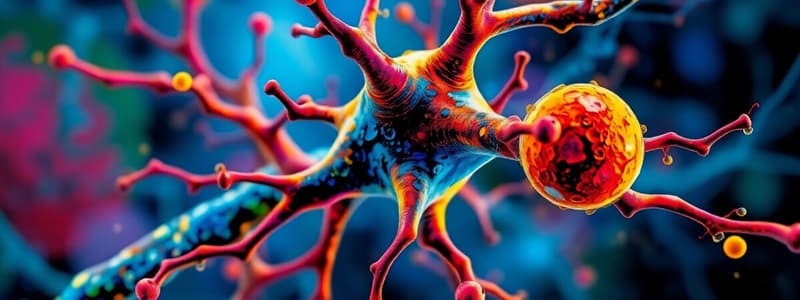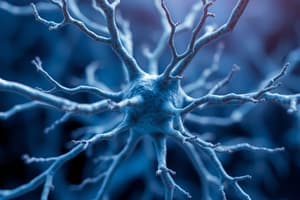Podcast
Questions and Answers
What role do calcium pumps and exchangers play in neurons?
What role do calcium pumps and exchangers play in neurons?
- They synthesize neurotransmitters from amino acids.
- They facilitate the opening of ion channels.
- They regulate intracellular calcium levels essential for neurotransmitter release. (correct)
- They remove damaged proteins from the cell.
Which precursor molecule is required for the synthesis of acetylcholine?
Which precursor molecule is required for the synthesis of acetylcholine?
- Dopamine
- Acetyl-CoA (correct)
- Choline (correct)
- Tyrosine
What is the main function of the myelin sheath in neurons?
What is the main function of the myelin sheath in neurons?
- To support protein synthesis
- To insulate axons and facilitate signal transmission (correct)
- To synthesize neurotransmitters
- To degrade excess neurotransmitters
What process is involved when neurotransmitters are taken back up into the presynaptic neuron?
What process is involved when neurotransmitters are taken back up into the presynaptic neuron?
Why is protein turnover important for neurons?
Why is protein turnover important for neurons?
What structure in the neuron is responsible for maintaining ion gradients necessary for action potentials?
What structure in the neuron is responsible for maintaining ion gradients necessary for action potentials?
Which of the following organelles is primarily involved in energy production within neurons?
Which of the following organelles is primarily involved in energy production within neurons?
What is the role of microtubules in neurons?
What is the role of microtubules in neurons?
What process is triggered by the arrival of an action potential at the axon terminal?
What process is triggered by the arrival of an action potential at the axon terminal?
Which statement about neuronal metabolism is true?
Which statement about neuronal metabolism is true?
Which component of the cytoskeleton provides structural support and mechanical strength in neurons?
Which component of the cytoskeleton provides structural support and mechanical strength in neurons?
What do synaptic vesicles contain that are critical for neurotransmission?
What do synaptic vesicles contain that are critical for neurotransmission?
What is the primary energy source for neurons?
What is the primary energy source for neurons?
What is the primary function of dendrites in a neuron?
What is the primary function of dendrites in a neuron?
Which component of the neuron is primarily responsible for maintaining the overall health of the cell?
Which component of the neuron is primarily responsible for maintaining the overall health of the cell?
What role does the myelin sheath play in neuronal function?
What role does the myelin sheath play in neuronal function?
Which structure in a neuron is responsible for the release of neurotransmitters?
Which structure in a neuron is responsible for the release of neurotransmitters?
What is the significance of dendritic spines in neurons?
What is the significance of dendritic spines in neurons?
How do nodes of Ranvier affect the conduction of action potentials?
How do nodes of Ranvier affect the conduction of action potentials?
What is the primary composition of the plasma membrane surrounding neurons?
What is the primary composition of the plasma membrane surrounding neurons?
Which part of the neuron is responsible for conducting electrical impulses away from the cell body?
Which part of the neuron is responsible for conducting electrical impulses away from the cell body?
Flashcards are hidden until you start studying
Study Notes
Neuron Structure
- Neurons consist of a cell body (soma), dendrites, and an axon.
- The soma houses the nucleus and organelles, controlling cell activities and metabolism.
- Dendrites receive signals from other neurons, increasing surface area for connections via dendritic spines crucial for learning and memory.
- The axon transmits electrical impulses away from the soma; it's often myelinated for faster signal transmission via saltatory conduction at Nodes of Ranvier, terminating in axon terminals releasing neurotransmitters.
Neuron Composition
- The plasma membrane, a lipid bilayer with embedded proteins, controls ion and molecule passage, essential for action potentials.
- The cytoplasm contains organelles like mitochondria (energy production), endoplasmic reticulum (protein synthesis), and the Golgi apparatus (protein transport).
- The cytoskeleton (microtubules, neurofilaments, actin filaments) provides structural support and facilitates axonal transport.
- Synaptic vesicles in axon terminals store and release neurotransmitters for communication across synapses.
Neuron Metabolism
- Neurons have high metabolic rates, primarily using glucose for energy via glycolysis, the citric acid cycle, and oxidative phosphorylation; the brain uses ~20% of the body's glucose-derived energy.
- The sodium-potassium pump maintains the resting membrane potential, crucial for action potentials.
- Ion channels (e.g., voltage-gated sodium and potassium channels) are essential for action potential generation and propagation. Calcium pumps regulate intracellular calcium for neurotransmitter release.
- Neurotransmitter synthesis (e.g., acetylcholine, catecholamines) and recycling (reuptake and enzymatic degradation) are critical for signaling.
- Myelin sheath lipid metabolism (cholesterol, sphingolipids) ensures proper axon insulation and function. Lipid metabolism also produces membrane components and signaling molecules.
- Protein synthesis and turnover in the soma and dendrites are vital for neuronal structure, function, and plasticity.
Studying That Suits You
Use AI to generate personalized quizzes and flashcards to suit your learning preferences.




